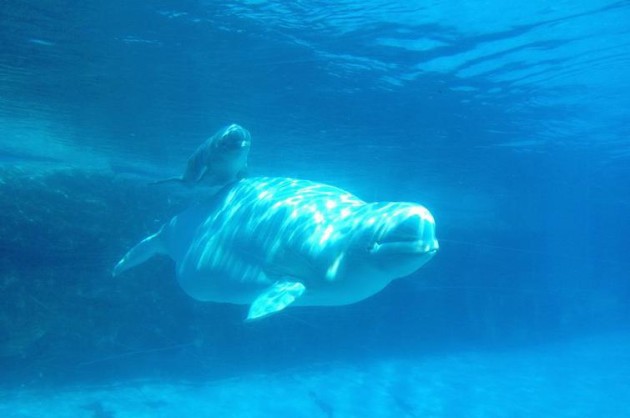[Htab][tab title=”Introduction”]
PHOTO Courtesy Marineland
Ottawa, ON, Canada (June 12, 2015) — On June 11, Senator Wilfred Moore (Liberal Party) of Nova Scotia and Green Party Leader and Parliamentarian Elizabeth May of British Columbia announced their intent to introduce the “Ending of Captivity of Whales and Dolphins Act,” which would ban captivity of cetaceans within Canadian jurisdiction. The proposal follows the May 28 passage of the “Ontario Society for the Prevention of Cruelty to Animals Amendment Act,” which placed a ban on the further acquisition and breeding of killer whales within the province, affecting solely Marineland of Canada in Niagara Falls, and set the stage for more stringent regulation and enforcement. By clicking on the above tabs, you will be able to access:
— Ontario Ministry of Community Safety and Correctional Services press release on passage of “Ontario Society for the Prevention of Cruelty to Animals Amendment Act”
— Transcript of 2014 Senate discussion between Senator Moore and Senator Claude Carignan, Leader of the Government, on whale and dolphin captivity
— Announcement by Senator Moore of intent to introduce the “Ending of Captivity of Whales and Dolphins Act”
— Statement from Marineland of Canada on the proposed legislation
— UPDATED 6/12/15: Listen to Vancouver Aquarium CEO John Nightingale speak on the proposed legislation on CBC Radio’s Early Edition. Vancouver Aquarium is the only other Canadian institution housing whales and dolphins for public display.
RELATED INPARK ARTICLES:
2012’s Biggest Battles Between Marine Life Parks and Animal Rights Groups
IPM EXCLUSIVE: SeaWorld Defends Itself Against California Bill to Ban Killer Whales in Parks
[/tab]
[tab title=”Ontario Legislation”]Toronto, ON, Canada (May 28, 2015) — Today the province passed the Ontario Society for the Prevention of Cruelty to Animals Amendment Act, which will prohibit the acquisition and breeding of orcas (killer whales) in Ontario effective immediately.
To ensure the province continues to have the strongest animal protection legislation in Canada, the bill contains a number of other measures to improve the oversight and well-being of all marine mammals in Ontario. This includes:
- –Rules that allow the government to require animal welfare committees at any facility that houses marine mammals
- –Rules that allow the government to require facilities that house marine mammals to have qualified veterinarians with expertise in marine mammal medicine to oversee preventive and clinical care
- –Penalties of up to $60,000 and/or two years in prison on first conviction for breaches of the Act
The province is also working on setting specific standards of care for marine mammals which will reflect advice from an expert report by Dr. David Rosen, a University of British Columbia marine biologist, and recommendations from a technical advisory group. When introduced, Ontario will be the first jurisdiction in Canada to set specific standards of care for marine mammals.
The amendments complete a three-point plan initiated in October 2012 to strengthen protection for all animals[/tab]
[tab title=”Oct. 2, 2014 Senate Transcript”]Hon. Wilfred P. Moore: My question today is for the Leader of the Government in the Senate. Leader, this note and question are from Ms. Caroline McNaught of Ottawa, Ontario, and she says:
Like me, many of you have likely heard of — if not seen — the 2013 documentary Blackfish, which details the suffering of captive killer whales in marine parks. Earlier this year, in response to that film, a California state legislator introduced legislation to phase out and eventually ban the keeping of killer whales in captivity.
In Canada, Marineland and the Vancouver Aquarium currently keep over 40 whales and dolphins in captivity — including beluga whales, dolphins, and a killer whale. These creatures are highly intelligent and social, and they ordinarily swim vast distances every day. Yet Canadian law currently allows whales and dolphins to be kept in pools to perform tricks for paying customers. Evidence has shown that this practice causes unjustifiable suffering, and that is why countries like Chile, Costa Rica, and India have banned the keeping of whales and dolphins in captivity.
Many other countries have imposed restrictions on imports and exports, unlike Canada, which has minimal restrictions on imports and does not regulate exports, allowing the Vancouver Aquarium to loan belugas to SeaWorld in the U.S. for captive breeding.
The Mayor of Vancouver and Jane Goodall have now called for an end to keeping the whales and dolphins in captivity at the Vancouver Aquarium, and The Toronto Star has been running an investigative report into the notorious conditions at Marineland.
My question, leader, it’s the question of Ms. McNaught: “Would this government support amending our animal cruelty provisions to phase out and eventually ban keeping whales and dolphins in captivity in Canada?”
Hon. Claude Carignan (Leader of the Government): Thank you, Senator Moore, for your question. You too have the option of introducing a bill if you think something needs to be fixed and that some legislative measure could be the cause of the problem.
Our government is committed to protecting the environment. Since we formed government, we have created two national marine conservation areas, three marine protected areas, three national wildlife areas, two national parks and one national historic site. We believe that the creation of these marine areas and protected areas will really help protect other marine species that could be at risk, including the ones you mentioned.
Senator Moore: Leader, are you suggesting that the program of your government is to eventually ban keeping whales and dolphins in captivity and that they should be released in these wonderful natural parks that you’ve created?
Senator Carignan: The government’s position when it comes to the conservation of marine areas involves creating parks or marine protected areas that help protect marine species, including the whales you mentioned. Senator, if you think this situation needs to be corrected, you always have the option of introducing a Senate private member’s bill to take corrective action. The Senate could then examine it, as it does all other bills.
Senator Moore: I have a supplementary question. I realize that any senator can bring in a bill, leader. I’m asking you, what is the position of your government with regard to the eventual banning of keeping whales and dolphins, cetaceans, in captivity in Canada?
Senator Carignan: Senator Moore, the government’s legislative intentions are made public in due form as our bills are introduced. As you know, the details of the government’s legislative intentions are revealed either through the Speech from the Throne, delivered here in this chamber, or through the introduction of legislation.
You can check the government’s intentions by looking at the relevant legislative instruments.
Senator Moore: I recall the Speech from the Throne with respect to protecting marine-sensitive parklands — I guess we can call them that, that is, the real estate in the waters, but I’m asking about the cetaceans, the whales and the dolphins, and whether or not you would be prepared to include them in your environmental legislation and policies. Are you saying this will lead to a phase-out — not an immediate ban — but a phase-out and a ban of keeping whales and dolphins in captivity in Canada?
You may not have the answer to that today, but I don’t think the answer is to tell me to bring in a bill. I’m asking you about the policy of your government, and I respect what you’ve done so far. I think it’s going in the right direction. I’d like you to follow up on that and let me know, if you can’t do it today, what the policy is. Maybe it hasn’t been thought of. This issue has come to light in the recent past, so maybe you haven’t had a chance to look at it. If you have not, I understand, but I’d like you to take a look at it, come back and let us know what the policy of the government is with regard to that question.
Senator Carignan: As I said earlier, our government is taking action to protect the environment, marine areas and humpback whales. You’ve probably heard about the important decision — based on scientific data — that was made on the humpback whale population, which continues to grow. I’ve spoken about this already, because we are seeing a constant increase in the number of humpback whales. These whales remain protected as a result of solid provisions in the Fisheries Act and in the Species at Risk Act. Our government is also taking action by creating protected areas. If you believe that a piece of legislation can improve that protection, I invite you to introduce a private member’s bill so that we can debate it.[/tab]
[tab title=”Moore Press Release”]Ottawa, ON, Canada (June 11, 2015) – Senator Wilfred Moore has announced a federal bill to phase out the keeping of whales and dolphins in captivity. “Keeping whales and dolphins in captivity is unjustifiably cruel,” said Senator Moore. “We should do the right thing and end the practice in Canada.” Senator Moore, a member of the Senate Liberal Caucus, will table the bill in the Senate this afternoon. He and several stakeholders – including Green Party Leader Elizabeth May – will offer details at a press conference today at 12:15 pm in the National Press Theater in Ottawa.
Senator Moore’s bill has the support of Gabriela Cowperthwaite, director of the CNN-distributed documentary Blackfish, which outlines the suffering of captive orcas. It also has the support of four ex-whale and dolphin trainers; Dr. Marc Bekoff of the Jane Goodall Institute; the Canadian Federation of Humane Societies; the British Columbia Society for the Prevention of Cruelty to Animals; and Zoocheck Canada (see below for quotes).
The Ending the Captivity of Whales and Dolphins Act prohibits captive breeding, imports, exports, and live captures of all whales, dolphins, and porpoises in Canada. The bill allows for the rescue of injured individuals. It builds on a recent Ontario law, which phases out keeping orcas in captivity (currently, there is one captive orca at Marineland in Niagara Falls, and approximately 50 beluga whales and dolphins at that facility and the Vancouver Aquarium).
Gabriela Cowperthwaite, Director of Blackfish
“I made Blackfish because I wanted to understand why a trainer came to be killed by a killer whale. I did not come from animal activism and had even taken my kids to SeaWorld. I simply had a question. I soon learned the heartbreaking story of orcas in captivity. All whales and dolphins suffer in marine parks, and seeing these incredible creatures reduced to performing tricks has no social, educational, or conservational value. It is time for us to evolve. I hope Canadians get behind Senator Moore’s bill and end this practice.”
This bill also has the support of three ex-SeaWorld trainers who appeared in Blackfish: John Hargrove, Samantha Berg, and Jeff Ventre.
Phil Demers, former Head Trainer at Marineland
“As a former Marine Mammal Trainer, I believe the bill to ban cetacean captivity and breeding in Canada is imperative and long-overdue. I have witnessed the physiological and emotional consequences captivity imposes on these magnificent beings, and those who care for them. No living being should be forced to endure what I’ve witnessed, and it’s my hope that this bill will finally put an end to these cruel practices.”
Dr. Marc Bekoff, Ethics Committee for the Jane Goodall Institute
“Science has clearly established that whales and dolphins suffer deep and enduring psychological and physical harms in captivity. The practice is ethically indefensible, and Senator Moore’s proposed ban would be a timely and important change in Canadian law. These highly intelligent, emotional, and social species deserve to live free in the wild, where they belong.”
Canadian Federation of Humane Societies
“Canadians do not support the archaic practice of confining and breeding whales and dolphins for the purpose of our entertainment. This bill puts Canada in a leadership position by advancing marine mammal science without exacting a cost to individual animals.”
This bill also has the support of the British Columbia Society for the Prevention of Cruelty to Animals.
Zoocheck Canada
“This Bill will address Canada’s outdated and inconsistent laws regarding the importation and possession of whales and dolphins and will bring Canada into lockstep with other progressive jurisdictions around the world that have moved to address cetacean captivity issues. But, perhaps most importantly, it will finally address the deprivation and suffering that these animals endure in tanks and pools.”
Senator Wilfred Moore
“I hope all parliamentarians and candidates will back this going into the election. Bottom line, whales should not be kept in swimming pools.”[/tab]
[tab title=”Marineland Response”]Niagara Falls, ON, Canada (June 11, 2015) — Senator Moore from Nova Scotia and Elizabeth May from British Columbia have introduced a bill today that has as its primary effect, throwing thousands of Ontarians out of work and diverting the one million visitors a year Marineland attracts to the Niagara Region to their own constituencies on either coast.
This Bill is a bicoastal job creation and tourism bill at the expense of Ontario, costing thousands of jobs inNiagara Falls and Niagara Region, and robbing the average people of Ontario from a fair opportunity to see our marine mammals.
When asked, Senator Moore said he was unaware of any economic impact his proposed bill will have on employment in Ontario of the people of Ontario.
This bill is all about promoting tourism for Senator Moore’s and Ms. May’s constituencies, and eliminating any competition.
Numerous independent studies and investigations have all concluded that the marine mammals at Marineland are healthy and well taken care of.
Dr. Noonan, an Academic Biologist with a specialty in Animal Behaviour and forty one years of experience conducting research in Animal Behaviour and Behavioural Neuroscience gave evidence at the Committee Hearings for Ontario’s Bill 80 as follows:
“The data from my research program at Marineland (of the Beluga Whales) indicate the following:
|
a. |
Behavioural indices of stress are very low |
|
b. |
High reproductive rates suggest psychological well being |
|
c. |
The belugas are able to express much of their natural behavioural repertoire |
|
d. |
High incidence of playful behaviour suggests positive affect is predominant.” |
The Ontario Government recognizes these facts and is putting in place appropriate scientific standards of care for all our marine mammals, so everyone in Ontario has a chance to see our unique marine mammals at Marineland.
It is clear that Senator Moore and Ms. May are focused on Tourism and know little about the whales they express so much concern about.
In fact, Senator Moore clearly knew little or nothing about Beluga Whales, publicly suggesting that there are only 880 Beluga Whales in Canada.
Fisheries and Oceans Canada reported in March of 2015 that “It is roughly estimated that between 72,000 and 144,000 belugas live in Canadian waters.” Over 50,000 of them live in Ontario. A far cry from 880.
Senator Moore and Ms. May were also quick to refer to Beluga Whales as “deep diving”, but failed to note the accepted scientific understanding of Belugas, “The majority of predicted habitat along the coast is consistent with Beluga behaviour in which they generally utilize shallow coastal waters, barely deep enough to cover their bodies.” (Ridgway and Harrison) (Goetz et al, 2012).
In fact, “River estuaries are very important summer habitat for Beluga. The whales rely on estuaries for a number of habitat functions, which may include foraging, moulting and nursery habitat, thermal advantage and protection from predators.” (The Beluga Management Plan, Ontario, Ministry of Natural Resources, 2013).
Most studies show a strong preference for Beluga Whales to remain on the surface or spend the vast majority of their time diving to depths of no more than 4 meters.
It is noted “The preference of this population for shallow water in summer is not dictated by an inability to dive to greater depths.” (Martin, Hall, Richard, 2000).
Beluga Whales only leave shallow estuaries when forced to by pack ice, returning immediately to shallow waters when the ice breaks up, and are able to dive to great depths, in part to avoid being eaten by their primary predator, Killer Whales.
Senator Moore and Ms. May shifted the focus of their press conference almost immediately to Marineland, and it is clear that the purpose of their Bill is to eliminate any opportunity for any Canadian (particularly Ontarians) to view or visit any Whale or Dolphin in Canada anywhere except in their ridings on the west or east coast.
The focus on Marineland is clear from the way they arranged for Mr. Demers to attend, whose catalogue of conspiracy theory and mass animal abuse allegations, have been unequivocally proven to be completely false after careful independent and thorough reviews by multiple separate teams of experts in marine mammals from a host of Government agencies. Mr. Demers appears to be motivated solely by revenge against Marineland over rejection of his proposal to Marineland that he star in a reality TV show featuring Marineland’s animals. He didn’t make a single allegation of abuse in twelve years until his reality TV show dream was crushed. Mr. Demers’ primary role at Marineland was feeding fish to marine mammals, under direct supervision, and his formal marine mammal qualifications are non-existent, as his education did not extend beyond graduating from high school. Relying on Mr. Demers with respect to marine mammal health and welfare is like relying solely on the opinion of a hospital orderly regarding the medical care of patients in a hospital, and deliberately disregarding specialist physicians and nurses.
Mr. Moore, and Ms. May, used their Press Conference to encourage tourism to their constituencies and to suggest that the best way to see any whale or dolphin is to do it from a boat.
While a visit to the East of West Coast is amazing, it is a visit that is well beyond the financial means of most average families in Ontario, and not the type of expenditure any family is generally prepared to make to view a whale or dolphin. Many families on the West or East coast decline to participate in very expensive whale watching trips in their own communities. Why should Ontarians be denied the opportunity to visit Marineland at a fraction of the cost?
It is ridiculous to suggest, as Ms. May and Mr. Moore have, that the average Ontarian should be forced to spend thousands of dollars to jet their whole families out to either coast to participate in a high end expensive whale watching event just so their children can see a dolphin or Beluga Whale.
As we all know, there are no guarantees you will see anything whale watching from a boat and may only learn what it is like to be seasick.
Furthermore, whale watching is far more stressful for any whale than visiting them at Marineland. As Dr. Noonannoted: “Behavioural indices of stress are very low” among Beluga Whales at Marineland. To the contrary, it has been noted that:
“The cumulative effect of changing behaviours, displacement, or the chronic stress induced by exposure to whale watching activity may translate into decline in health and vital rates.”
That is why Marineland continues to welcome almost a million visitors a year to view marine mammals that cannot be viewed anywhere else except at enormous expense, if they can be viewed at all.
Since Marineland opened over fifty years ago, we have hosted, educated and entertained literally millions of young people and families.
We have heard from many marine biologists, veterinarians, conservationists and oceanographers that it was their childhood experience at Marineland that inspired them to learn more about the wonders of the ocean and its amazing aquatic life. Ontario’s children who come to visit and learn about animals they might never know existed will grow up to the champions of the wild cousins of the animals you find at places like Marineland.
Marineland notes that the Bill forces immediate closure of all marine mammal facilities, which demonstrates the lack of care or thought for marine mammals that went into this Bill.
All of the Killer Whale, dolphins and majority of Beluga Whales were, long ago, classified as wild capture, and as a consequence cannot be legally relocated anywhere. This Bill mandates their execution by legislation. No sea pens exist that can house Beluga Whales as all Arctic bays are choked with ice for half the year.
Even the most prominent activist in the United States, Naomi Rose, on behalf of the Humane Society of the United States, recognizes these issues and has publicly stated:
“We are proposing a phasing out of orca exhibition, taking as long as three decades, giving Oceanaria sufficient time to repurpose their orca enclosures. We believe this is eminently reasonable and will minimize the financial impacts of ending this practice.”
Naomi Rose, September 2011
This Bill is an opportunistic effort to shut Marineland to unfairly attempt to benefit one group of Canadians at the expense of another.
Marineland notes that this is a private senator Bill and Marineland trusts that the Government will act responsibly in the interests of all Canadians and reject this ill-informed, unscientific, misguided, and transparent effort to enrich Mr. Moore’s and Ms. May’s own ridings at the expense of all Ontarians.[/tab]
[tab title=”John Nightingale on CBC Radio”] Click link to access:
[/tab]
[/Htab]






